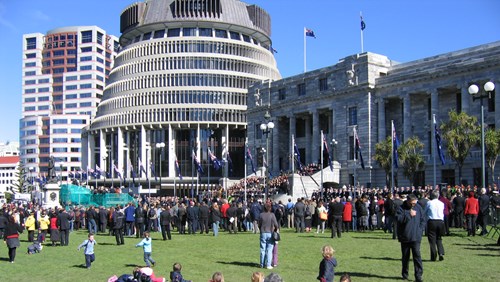
Why Do People Stay During Natural Disasters?
When deciding whether to shelter in place during an emergency, social roles, environmental knowledge, economic status, and other factors weigh heavily over government information and directions, according to a new Yale School of the Environment study.
“There’s more to the story of non-evacuation than what literature and popular conversation suggests,” said doctoral student Evan Singer ’19 MESc, ’24 MPhil, who led the study. “People who don’t evacuate are often acting rationally and with ample information. It’s just that they’re acting on different information, leading to this disconnect between state and local actors.”
The study, published in Environmental Research Letters , found that a mismatch between government and public perceptions of natural disasters — and not solely a lack of information — can lead some residents to remain in their homes despite evacuation efforts. The researchers said that given the increasing frequency of extreme weather events, the study’s insights could encourage government leaders to incorporate the experience of local community members into their future evacuation efforts. The study was co-authored by Michael Dove, the Margaret K. Musser Professor of Social Ecology and Anthropology, and doctoral students Andrés Triana Solórzano and Shoko Yamada ’22 MPhil.
The researchers drew from interviews, observations, scientific studies, and news media reports on events in Japan, Indonesia, and the U.S. to compare government perceptions and public reactions to impending natural disasters.
Solórzano observed South Florida hurricane “parties,” where neighbors who are sheltering in place gather to share food, drink, and advice in the days and hours before the storms strike. Yamada collected data on disaster preparedness in Japan in the wake of lethal 2018 floods and mudslides. Dove’s research — spanning more than four decades — centered on Mount Merapi, an active volcano on the island of Java that is one of the deadliest volcanoes in the world. In all the cases, the YSE scientists found that government officials and residents differed in their perceptions of the events.
In his research on Merapi, Dove found that while scientists actively monitor volcanic activity, the national government in Jakarta and the royal court of Yogyakarta are more highly attuned to the actual moments of Merapi’s eruptions and the immediate aftermath. Located near Yogyakarta, a city of nearly 400,000 people, Merapi is highly active. It last erupted in 2023. When eruptions occur, the Indonesian government often tries to permanently relocate the thousands of highland farmers who live on Merapi’s slopes to less-favorable environments to avoid casualties and threats to government control. Villages perceive that when the danger to leaders’ power recedes, they are largely ignored, the researchers said.
In contrast to the government’s sharp focus on volcanic events, highland farmers concentrate on the peaceful periods between eruptions with little state intervention. While some accept temporary evacuation to refugee camps, they reject permanent relocation efforts that would threaten their livelihoods. The authors suggest that this divergence in perspectives between governments and community members — particularly in terms of the short- versus long-term impacts — helps explain why some people choose to remain despite the risks.
“They don’t want to evacuate. They know the state would remove them to less favorable outposts and have made peace with the danger of living so close to Mount Merapi,” Dove said.
In the U.S., Gulf Coast officials pay close attention to approaching hurricanes and storms and provide detailed information to community members about the dangers and need to evacuate. Attendees are aware of the storms’ dangers and options for evacuation. However, those who stay appear to be more focused on community responsibilities and the future, which outweigh the benefits of evacuation, and they build community and social solidarity at hurricane “parties,” Triana Solórzano said.
The researchers found that a sense of community solidarity also drove behavior in Japan during the 2011 earthquake and tsunami, which killed more than 18,000 people. According to disaster preparedness officials in Japan, some of the people who died had stayed behind to help vulnerable community members evacuate. Similarly, during the 2018 floods in Japan, many elderly residents (some who were physically unable to leave their homes without help) relied on family members’ evacuation advice over government mandates. Disaster preparedness advocates in Japan are working to ensure government officials responsible for planning evacuation efforts take into account how information from family, community members, and the media influences personal decision-making.
The team said their comparative approach that incorporates residents’ long-term concerns with short-term safety goals can help inform state disaster preparedness and aid government efforts in disaster responses.
“There’s a lot of emphasis on reaching different groups with more emergency information, which I think should continue,” Singer said. “But understanding that people operate using different information, as well as sometimes not enough information, is a really important distinction for policymakers.”
https://environment.yale.edu/news/article/what-keeps-people-evacuating-during-natural-disaster


